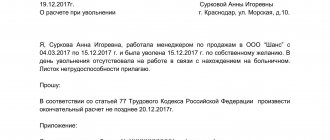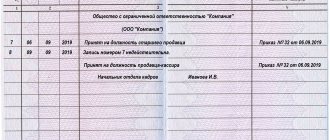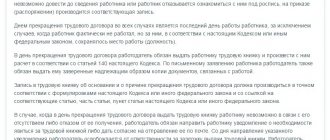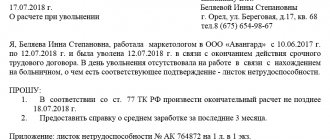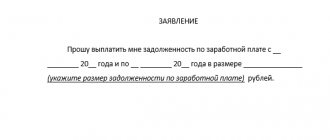Author of the article: Roman Gavrilov Last modified: January 2021 34462
When concluding an employment contract, trust between the employee and the employer is assumed and is rarely specified in a separate clause. Legal relations of an official nature are subordinate and assume that the employee follows legal orders, the order of the head of the enterprise or department. The legality of the actions of the parties to labor relations is justified by the Labor Code of the Russian Federation, special regulations of a general and local nature. Dismissal under the article “loss of trust” is permitted in exceptional cases.
Grounds for dismissal
The Labor Code does not contain a list of grounds on which an employee may be dismissed due to loss of trust. It is determined by the manager independently. Typically, the following employee actions entail a loss of trust:
- Theft or damage to material property of the enterprise.
- Violations in the performance of cash transactions.
- Selling products at an inflated or reduced price.
- Write-off of tangible property that is contrary to the law and regulations of the enterprise.
- Fraud.
- Discrepancies between the employee’s actions and the adopted local regulations on working with material assets.
- Causing material damage to an enterprise due to the intentional actions of an employee.
- Corrupt actions.
Question: What liability will be applied for failure by an official to report information about the dismissal of an employee due to loss of trust in the relevant register (Article 5 of the Federal Law of July 1, 2017 N 132-FZ “On amendments to certain legislative acts of the Russian Federation regarding placement in state information system in the field of civil service information on the application of a penalty in the form of dismissal due to loss of confidence for committing corruption offenses”, Article 15 of the Federal Law of December 25, 2008 N 273-FZ “On Combating Corruption”)? View answer
IMPORTANT! A sample entry in the work book about dismissal due to loss of trust from ConsultantPlus is available at the link
Dismissal under the article in question is the employer’s right, not an obligation. Removal from service may be replaced by reprimands and disciplinary sanctions. When registering a dismissal, the following important conditions must be taken into account:
- An employee cannot be suspended if the identified violation is not related to his official duties.
- Dismissal can be carried out either on the basis of a court ruling on the relevant incident or without it.
- The basis for terminating the employment contract must be proven. For example, if the dismissal occurred due to theft, you need to prove this fact. This can be done using video from surveillance cameras and witness testimony.
IMPORTANT! The employer must provide for the risk of employee dishonesty. To do this, it is necessary to conclude an agreement with the employee on financial responsibility or work with material objects. Without this document, it will be more difficult to formalize your dismissal legally. However, if the contract has not been created, it is still possible to terminate the employment relationship on the basis that the employee worked directly with material assets or money.
Register of those dismissed due to loss of trust
From January 1, 2021, a register of those dismissed is maintained on the basis of clause 7.1, part 1, art. 81. It does not include data on employees servicing commodity and monetary assets. Only data on various types of civil servants and persons holding government positions, former employees of the Central Bank of the Russian Federation, etc. are included.
The register is located on the Internet at: https://gossluzhba.gov.ru/reestr/. At the time of writing, 1,311 employees were laid off. The procedure for maintaining the register is established by the Regulations approved by Decree of the Government of the Russian Federation dated March 5, 2018 No. 228.
Dismissal procedure
The employer cannot simply terminate the contract and make a corresponding entry in the work book. The process of dismissal under the article is quite lengthy, involving the preparation of a number of documents. This is why employees are usually asked to leave voluntarily. If the manager decides to terminate cooperation due to loss of trust, you can use the following algorithm:
- Documentation of the detected violation . The law does not regulate the form of the document that is required to be drawn up in this case. As a rule, a memorandum is drawn up. It must contain all the necessary information: full name of the employee who identified the violation, the circumstances of the offense, its consequences. The date and time of detection of the employee’s unprofessional actions is indicated. If material damage is detected as part of the inventory, an inspection report is drawn up with appropriate instructions.
- An official investigation . During the investigation, the culprit is identified. A commission is organized, which includes three or more persons. An order for its creation is issued. Based on the results of the investigation, a report is drawn up. It is signed by all persons participating in the commission.
- Receiving an explanatory note . An explanation of what happened in writing must be obtained from the employee at fault. The employee is given 2 days to draw up an explanatory note. The employee may refuse this. Under the circumstances under consideration, an act of refusal will be required on the basis of Article 193 of the Labor Code of the Russian Federation.
- Preparation of documents on the basis of which dismissal is carried out . An order for disciplinary action is issued. After this, you need to issue an order to terminate the employment relationship. The employee must be familiarized with the order. To confirm familiarization, a signature is placed.
- A corresponding entry is made in the employee’s work book and personal card . The book must be issued on the day of dismissal.
- The employee receives all appropriate payments . The money must also be issued on the last day of work.
Is it possible to dismiss the head of a municipal institution due to loss of trust?
IMPORTANT! Representatives of law enforcement agencies can inform the employer about a violation. In this case, no report is drawn up.
Example of an entry in a work book
An entry can be made in the work book in the following format:
“The employment relationship was terminated on the basis of violations on the part of the materially responsible employee, giving grounds for loss of trust, clause 7, part 1, article 81 of the Labor Code of the Russian Federation.” Specialist A. N. Sidorova
The legality of applying this basis.
Only an employee directly servicing inventory items can be fired for loss of trust.
Let's consider the Decision of the Moscow Regional Court dated August 3, 2010 in case No. 33-15055.
The Judicial Collegium of the Moscow Regional Court, having considered the cassation appeal of Vortex LLC against the decision of the Podolsk City Court of the Moscow Region dated June 16, 2010 in the case of Sh.’s claim against Vortex LLC for reinstatement at work, recovery of wages for the period of forced absence, established the following .
Sh. filed a claim with the court for reinstatement in the position of senior shift manager of the acceptance department, recovery of wages for the period of forced absence from 03.12.2010 to the day of the court decision. He motivated his demands by the fact that, on the basis of an order dated March 11, 2010, an employee who directly served monetary or commodity assets was dismissed as having committed guilty actions, and these actions gave rise to a loss of confidence in him on the part of the employer. He considered the dismissal illegal, since his job duties did not include the direct maintenance of inventory items; upon dismissal, the procedure for applying disciplinary sanctions provided for in Art. 193 Labor Code of the Russian Federation.
The defendant's representative did not admit the claim at the court hearing.
The court's decision satisfied the claims.
Having disagreed with the decision, in a cassation appeal the defendant asked the court's decision to be overturned.
During the consideration of the case, the judicial panel established that from 01/01/2009 an employment contract was concluded with the plaintiff, as well as an agreement on full financial liability.
On January 27, 2010, the Internal Affairs Directorate for the city district of Podolsk opened a criminal case under Part 1 of Art. 158 of the Criminal Code of the Russian Federation in relation to N., also working in the acceptance department at Vortex LLC, on the fact of theft of products from a warehouse. And the order dated March 10, 2010 approved the results of an internal investigation to clarify the circumstances relevant to the specified criminal case, on the basis of which the decision was made to dismiss the employees of the acceptance department, including Sh.
In accordance with paragraph 7 of Art. 81 of the Labor Code of the Russian Federation, an employment contract can be terminated by the employer if guilty actions are committed by an employee directly servicing material assets.
Due to the legal position of the Plenum of the Armed Forces of the Russian Federation, set out in Resolution No. 2, and Art. 193 of the Labor Code of the Russian Federation, the court reasonably came to the conclusion that the defendant did not provide evidence of the plaintiff’s guilt in committing the theft of property and improper performance of his job duties.
As the court of first instance established, explanations from Sh. were received during an official investigation to clarify circumstances relevant to the criminal case. No other explanations were required from Sh., and no disciplinary measures were taken.
The cassation instance did not find grounds to cancel the decision of the Podolsk City Court of the Moscow Region, and therefore left the cassation appeal of Vortex LLC without satisfaction.
Features of dismissal of different categories of workers
Termination of employment contracts with employees in different positions has some nuances.
Military personnel
Military personnel are subject to increased requirements, regulated not only by the Labor Code, but also by federal laws. Dismissal may be carried out on the following grounds:
- Information about the income of the employee, as well as his family members, is deliberately hidden.
- A soldier is engaged in business activities.
- A person is engaged in managing a commercial company, receiving income from it.
All these nuances are specified in the Federal Law “On Military Duty”.
Accountant
It is impossible to dismiss an accountant due to loss of trust, since, according to the Regulations “On Chief Accountants” of January 24, 1980, such employees are not financially responsible persons. Employees do not interact with the money supply directly. However, you can terminate the employment relationship with the accountant-cashier, who is responsible for the safety of funds.
Supervisor
It will also not be possible to dismiss managers and directors of an enterprise under this article. They do not interact with cash, do not store or transport the money supply, and therefore do not bear financial responsibility.
Answers to frequently asked questions
In the process of dismissing an employee due to loss of trust, both employees and employers may have questions that are typical.
Question 1. I hired a seller, but we did not have time to conclude an agreement on full financial liability. They only drew up an employment contract. The girl stole money from the cash register, which she does not admit now. How can I fire her due to loss of trust?
Answer 2. If the employment contract stipulates the obligation to preserve material assets, then the dismissal procedure is the same as if there is an agreement on material liability. Otherwise, the employee will have to be fired under another article of the Labor Code of the Russian Federation, and the fact of theft will be dealt with by the investigative authorities.
Statute of limitations
For disciplinary offenses that caused these extreme measures, certain statutes of limitations are provided:
- 1 month from the date of discovery of the offense;
- 6 months from the date of commission of the offense, not counting the time of criminal proceedings;
- in the case of an audit of financial and economic activities, 2 years from the date of commission;
- 1 year from the moment the employer became aware of the commission of an act outside the place of work.
Time of illness or vacation is not included in this period. Any person has the right to appeal his dismissal in court.
Legal documents
- Article 81 of the Labor Code of the Russian Federation. Termination of an employment contract at the initiative of the employer
- Article 261 of the Labor Code of the Russian Federation. Guarantees for a pregnant woman and persons with family responsibilities upon termination of an employment contract
- Article 269 of the Labor Code of the Russian Federation. Additional guarantees for employees under the age of eighteen upon termination of an employment contract
- Article 244 of the Labor Code of the Russian Federation. Written agreements on full financial responsibility of employees
- Resolution of the Plenum of the Supreme Court of the Russian Federation dated March 17, 2004 N 2
- Article 192 of the Labor Code of the Russian Federation. Disciplinary action
- Article 193 of the Labor Code of the Russian Federation. Procedure for applying disciplinary sanctions
- Resolution of the Plenum of the Supreme Court of the Russian Federation dated March 17, 2004 N 2
Exceptional case
“Loss of trust is possible not only for abuses committed, but also for the employee’s negligent attitude towards his duties,” comments Moscow lawyer Sergei Voronin. – This includes, for example, storing keys to premises with valuables in publicly accessible places, leaving material assets unattended, issuing money without completing the relevant documents, etc. But the end of a trust relationship between the owners of companies cannot cause the exclusion of one of them from composition of founders. Firstly, the founders are not subjects of labor law in relation to each other, and the concepts of “employee” and “employer” are not applicable here in principle. Moreover, according to Article 10 of Federal Law No. 14-FZ, a company participant can be expelled in court for gross violations of his duties or for actions (inaction) that make the company’s activities impossible or significantly complicate it; These actions (inactions) must relate to the actions of a member of the company. In a controversial situation, there are no grounds for excluding the defendant from the list of owners (resolution of the Administrative Court of the North Caucasus District dated January 29, 2021 in case No. A63-5068/2015).”
note
When identifying a shortage of valuables entrusted not to a specific employee, but to a team of financially responsible persons, expressing distrust to all members of the team without establishing the specific guilt of each of them is unacceptable.
Most often, difficulties arise when employees lose trust, to whom money and goods are not directly entrusted, but they “deal with them” on duty. We are talking about security guards, loaders, etc. At the moment, there is no clear judicial practice on this issue, therefore, if you decide to fire such an employee, you need to be especially careful when choosing the basis.
As for employees whose positions and occupations are not included in the “cherished” Lists, and who, according to employment contracts and instructions, are not allowed to directly handle cash and goods, they cannot be dismissed on the basis of paragraph 7 of part 1 of Article 81 TC (although exceptions to this rule are rare, they do occur).
As an example, I would like to cite the position of an accountant. After all, even the “highest” judges emphasized that an accountant, including the chief one, does not belong to employees who directly service monetary or commodity values (see the definition of the Supreme Court of the Russian Federation No. 57-095-41). Accountants carry out all manipulations with money either on paper or in an electronic system.
RESULTS
Thus, Article 81 of the Labor Code of the Russian Federation - dismissal due to lack of confidence - provides that employees who service commodity and monetary assets, as well as civil servants, must not commit misconduct that could undermine the employer’s trust in them.
If violations are detected, the employer has the right to dismiss such employees subject to the procedure provided for in Art. 192, 193 of the Labor Code of the Russian Federation, as well as Federal Law No. 273. You can find more complete information on the topic in ConsultantPlus. Free trial access to the system for 2 days.

